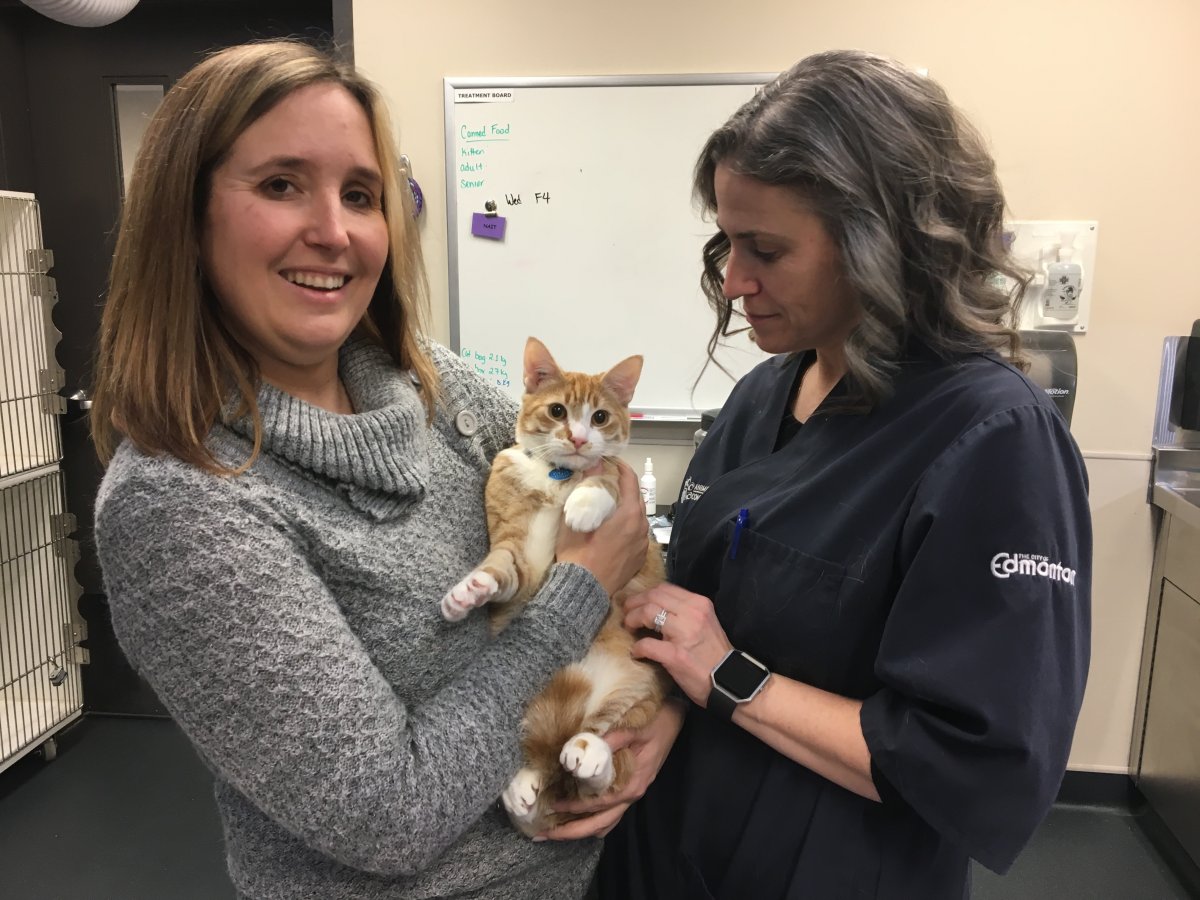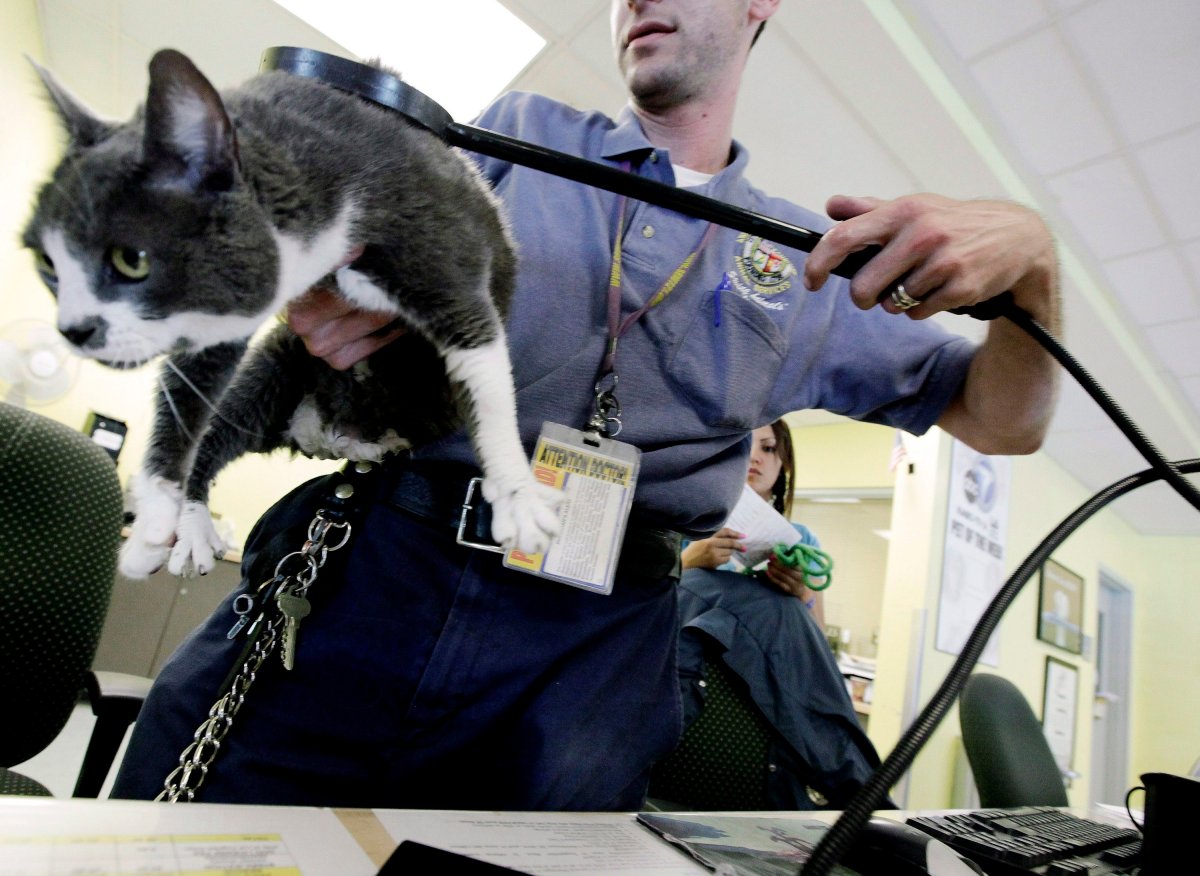Less than a fifth of thousands of lost cats found in Edmonton each year ever get returned to their owner, so the city is launching a six-month pilot project to increase that number by offering free microchips with the purchase of a pet licence.

“So the idea of putting permanent ID on them gets them home,” explained Animal Care & Control Centre community relations advisor Tanya Laughren. Microchips can be scanned at any vet’s office, by the Edmonton Humane Society or at the ACCC, which takes in lost and stray pets in Edmonton.
“The ID links them to their owner, it has all the contact information, gets them out of here much quicker and sometimes not even coming in here.”
READ MORE: Edmonton Humane Society sees unprecedented number of abandoned cats in 1 day
While 85 per cent of dogs at the ACCC are returned to their owners, only 16 per cent of the 4,000 cats they take in each year make it home due to a lack of ID.
“There is a perceived value of cats: it seems that you can kind of get one off Kijiji for a dollar, so people don’t come looking as quickly,” Laughren said,
“If it’s an outdoor cat, you might not be looking for a couple days and then it’s already gone through our system. Every black cat looks like another black cat. And then often people don’t know which cats need to come in here and which don’t because there are so many different cats roaming our streets.”
READ MORE: Here’s why you should always microchip your cat
The Animal Care & Control Centre’s cat microchipping pilot program will run until June, with clinics happening from 10 a.m. to 3 p.m. on the last Thursday of each month. Owners can bring their licensed, crated cat into ACCC (13550 163 St.) for placement of a microchip. If a cat isn’t already licensed, owners can purchase one that day.
The procedure to put the chip under the cat’s skin is simple.
“You can’t see the microchip itself, it is about the size of a grain and we do implant it between the shoulder blades,” explained registered veterinary technologist Karen Melnyk, who is the medical supervisor at ACCC.
“It’s quick, it’s painless, it’s just a little pinch like you would get if you were to get a vaccination at your local doctor. So you can’t see it like you would a tattoo. Difference between the tattoo and the microchip — the tattoo will fade over time while the microchip is always implanted.”
Owners are responsible for making sure the contact information on the microchip is up to date, and changes are made online.
READ MORE: Alberta dog reunites with owner in Manitoba
Laughren said cats being indoors is one of the reasons some owners don’t opt for microchips.
“People think they’re not going to get out and they do get out — we see it all the time. So just because you have an indoor cat doesn’t mean you shouldn’t have ID — and again, bylaw does state that you have to have a licence for your cat.”
Other owners choose not to microchip their cats due to the added cost, according to The Original Spay Clinic. The veterinary facility in downtown Edmonton, which has been doing affordably priced spays and neuters for dogs and cats for over 35 years, said about 50 per cent of the cats they operate on get a microchip at the same time. They charge $50 if the chip is put in while the cat is there for surgery and $65 if it’s a standalone procedure.
Laughren said the cost of getting a microchip implanted at a vet’s office varies anywhere from $50 to over $200, as each clinic sets their own fees.
READ MORE: Proposed legislation in Alberta would offer vet fee protection for pet owners
A City of Edmonton cat licence is just $21 for a fixed animal, while the cost for an intact/not fixed animal is $76. The city charges less for a fixed animal as a way of promoting population control.
Owners taking cats to the ACCC microchip clinics must present government-issued photo ID and proof of ownership, which Laughren admits can be tricky if you got your cat informally from a friend or a farm.
“What we do ask for is any sort of email or contract that shows that you did adopt the animal or it was transferred to you. We also do vet records, so that there’s a history that you have been caring for that animal and you are the one paying the bills and giving it its daily care.”
She said a past licence or microchip from elsewhere is also acceptable.
“And if we have to, we will go through historic photos — something that shows that you got the animal. Even a Facebook post that says, ‘Here’s a new animal’ and it’s from many years ago — that’s something that we can use as well.”
The City of Edmonton requires all cats and dogs over six months of age — even indoor pets — to be licensed and owners are required to renew it every 12 months. The fine for not having a valid pet licence is $250.







Comments